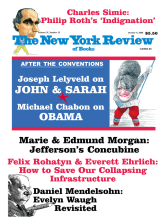In response to:
The Question of Global Warming from the June 12, 2008 issue
To the Editors:
I greatly admire Freeman Dyson, one of the most notable physicists of his generation. So it is with no pleasure that I make three criticisms of his essay “The Question of Global Warming” [NYR, June 12].
First, the essay begins with a characteristically clear and elegant exposition of the annual uptake of carbon dioxide by plants, and the subsequent reemission from respiration or decay. This leads Dyson to the conclusion that “the average lifetime of a molecule of carbon dioxide in the atmosphere…is about twelve years.” Dyson correctly emphasizes that such a timescale is fundamental to discussions of global warming. Unfortunately, however, estimates of the characteristic “residence time” of a molecule of carbon dioxide in the atmosphere involve a complicated mélange of factors, leading to the conclusion that although almost half of newly added carbon dioxide molecules remain for only a decade or two, roughly a third stay for a century or more, and fully one fifth for a millennium (see, e.g., Atmospheric Chemistry and Physics, Vol. 7 (2007), pp. 2287–2312). This is why the residence time of such molecules is generally characterized as a century.
This difference between twelve versus one hundred years is no minor pedantry. A major argument for the need for urgent action now, even though truly major consequences of global warming may lie some decades ahead, is that the carbon dioxide molecules we are putting into the atmosphere today are going to hang around, continuing to thicken the greenhouse gas blanket, for a long time.
Second, Dyson scolds the Royal Society—the British Commonwealth’s leading academy of science, founded in 1660 and, among other things, the initiator of peer-reviewed publications—for its “dogmatic tone” on issues of climate change. It should be noted, however, that the Royal Society was only one among eleven leading academies (including all of the G8 science academies—US, Japan, Germany, France, UK, Canada, Italy, Russia—along with those of China, India, and Brazil) who on the occasion of the G8 Summit in 2005 took the unprecedented step of issuing a brief statement to the effect that climate change is real, primarily human-associated, and calling for
cost effective steps that can be taken now to contribute to substantial and long-term reduction in net global greenhouse gas emissions [and to] recognise that delayed action will increase the risk of adverse environmental effects and will likely incur a greater cost.
Third, Dyson’s annoyance at the Royal Society and others derives from his worry that “in the history of science it has often turned out that the majority was wrong and refused to listen to a minority that later turned out to be right.” This is a valid worry. But its application varies as one advances on the scientific journey of investigating any particular topic.
A particularly clear and topical example of this process is to be found in the recent debates about the extent to which human activities are causing global warming, as distinct from warming deriving from natural causes. Even three decades ago there were very significant uncertainties associated with our quest for understanding. With computational power doubling every eighteen months, things have greatly advanced since then, and the basic facts are now unambiguous. Hence the recognition by the G8+3 science academies that we are well past the point where we should doubt the serious consequences of climate change.
Freeman Dyson’s essay concludes with a ringing endorsement of “environmentalism, as a religion of hope and respect for nature.” He fears that “obsession with global warming” is distracting attention from more serious problems, including nuclear weapons, environmental degradation, and social inequities. I wholeheartedly agree that these are equally important problems, receiving too little attention. But I put climate change right up there with them.
Robert M. May
Former President of the Royal Society (2000–2005)
Chief Scientific Adviser to the British Government (1995–2000)
Oxford, England
Freeman Dyson replies:
Lord May and I have several differences of opinion which remain friendly. But one of our disagreements is a matter of arithmetic and not a matter of opinion. He says that the residence time of a molecule of carbon dioxide in the atmosphere is about a century, and I say it is about twelve years.
This discrepancy is easy to resolve. We are talking about different meanings of residence time. I am talking about residence without replacement. My residence time is the time that an average carbon dioxide molecule stays in the atmosphere before being absorbed by a plant. He is talking about residence with replacement. His residence time is the average time that a carbon dioxide molecule and its replacements stay in the atmosphere when, as usually happens, a molecule that is absorbed is replaced by another molecule emitted from another plant.
Another way of describing the difference is in terms of the total amount of carbon dioxide in the atmosphere. His residence time measures the rate at which the total amount would diminish if we stopped burning fossil fuels. My residence time measures the rate at which the total amount would diminish if we replaced all plants by carbon-eaters which do not reemit the carbon dioxide that they absorb.
In my review I was discussing the use of carbon-eating plants to sequester carbon dioxide from the atmosphere. I remarked that we might hypothetically replace a quarter of existing plants by carbon-eating varieties, in which case the carbon dioxide in the atmosphere would disappear with an average residence time of four times twelve years, rapidly enough to forestall any plausible catastrophe resulting from rising abundance of carbon. This calculation is arithmetically correct, in that hypothetical situation, with enough carbon-eating plants to do the job of sequestration. Since we are discussing the effect of carbon-eating plants, my use of the short residence time without replacement is correct, and his use of the long residence time with replacement in that situation is wrong.
This Issue
October 9, 2008



